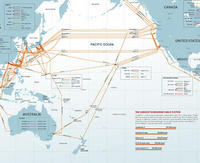
Let’s study it to death:
The United States is starting to look like a slowpoke on the
Internet. Examples abound of countries that have faster and cheaper
broadband connections, and more of their population connected to them.
What’s less clear is how badly the country that gave birth to the
Internet is doing, and whether the government needs to step in and do
something about it. The Bush administration has tried to foster
broadband adoption with a hands-off approach. If that’s seen as a
failure by the next administration, the policy may change.
In a move to get a clearer picture of where the U.S. stands, the House
Energy and Commerce Committee on Tuesday approved legislation that
would develop an annual inventory of existing broadband services —
including the types, advertised speeds and actual number of
subscribers — available to households and businesses across the nation.
—
U.S. sees some countries overtake it in broadband speeds, but is there a problem?
Associated Press,
30 Oct 2007
On the one hand, this sounds like a popular approach to global
warming by its deniers:
now let’s ask some scientists to study it.
After all,
the Okefenokee and surrounds burned more acres than in
living memory, western wildfires have increased fourfold since 1970,
30 million people in half a dozen southwest states may run out of water
in the next decade or so, and 12 million people in the Atlanta metro
area are less than 3 months from having no water.
And hundreds of climate scientists have already turned in their verdict.
But, hey,
now let’s ask some scientists to study it.
On the other hand, this is Ed Markey’s committee, and he has seemed
serious about doing something, so maybe he’s just cojmpiling a case.
Sure, he’s probably reacting to people like this who are taking the
same tack as outlined above:
Continue reading →
 Prof. Jean Camp points out that:
Prof. Jean Camp points out that:






